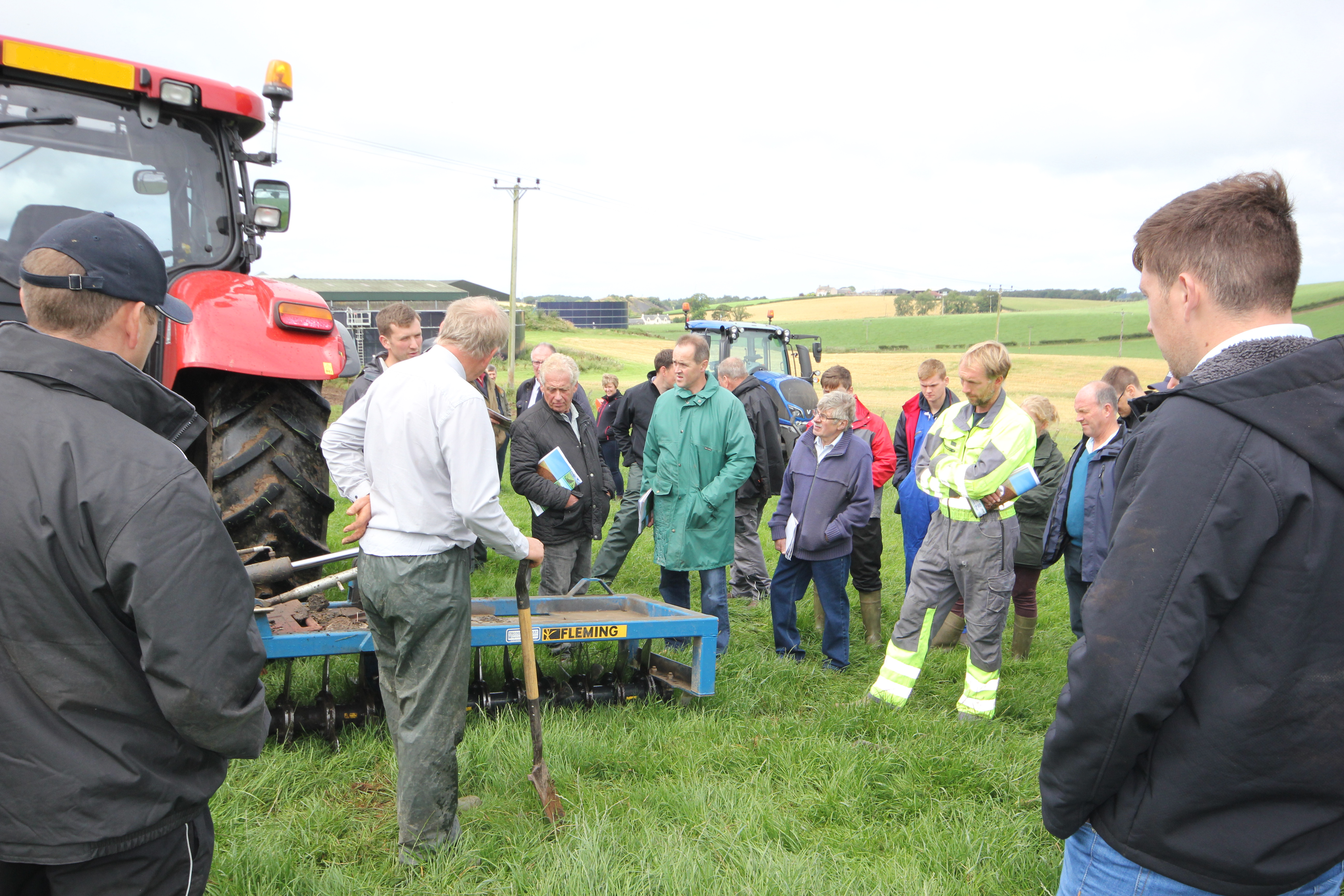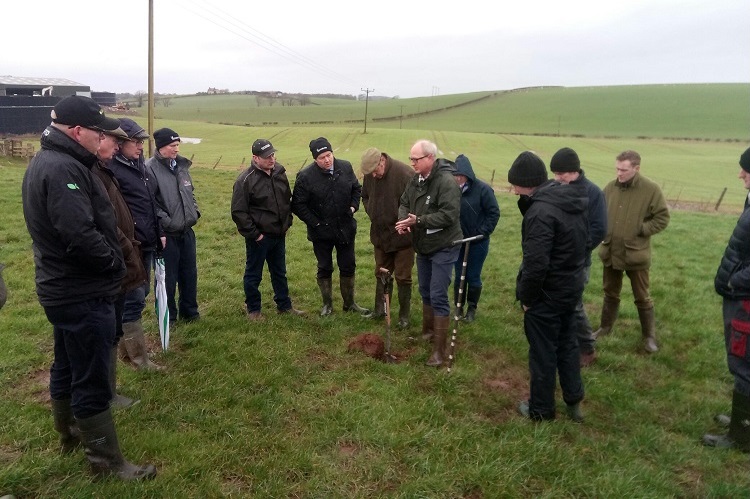Ayrshire Soil & Nutrient Network: Final meeting – event summary
28 February 2020This was the final meeting of the Ayrshire Soil & Nutrient Network and we returned back to where we started – at our host farm Dormieston.
The focus for the event was on ‘Establishing and managing a spring grass ley’, although the weather on the day was very far from spring-like!
Our key speakers during the event included:
- Dr Bill Crooks – a Soil Specialist with SAC Consulting
- William Fleming – Germinal UK
- Lorna Galloway, SAC Consulting
The meeting began with Dr Bill Crooks giving a demonstration of a visual evaluation of soil (VES) where he commented on compaction, structure, organic matter content and worm counts as well as some methods to reduce compaction, particularly from overwintering sheep on lowland grazing grounds.
SAC Consulting’s Lorna Galloway and Germinal UK’s William Fleming then led a group discussion on winter grazing strategies as well as the cost benefits of a spring grass reseed. There were a number of SRUC Agricultural Students in attendance who got involved at this point. Finally, after lunch, Bill returned to lead a discussion about the ins and outs of digestate as a farm manure and soil conditioner. While it is becoming more common in Ayrshire only one of the group was actively taking digestate.
The key messages to take from this event are:
- Maintaining a good farm waste management plan and regularly soil sampling cannot only be a practice undertaken by top-performing farms, but it also has to become routine for all farm businesses as a matter of best practice.
- Liming is still hugely important and prilled lime has now become an effective alternative to conventional bagged lime, due to cost reductions.
- Set stocking wintering sheep is an ineffective way of maintaining grass in good condition and will cost you yields come spring.
- In many cases, a milk yield increase and the associated income will cover the cost of a reseed.
A number of handouts were available to take away from the event. These and a selection of other relevant documents can be downloaded using the links below.
Related News
Ayrshire Soil & Nutrient Network: 1st meeting event summary
This was the 1st meeting of the Ayrshire Soil & Nutrient Network Farm and it began with an introduction to the farm from host John Sloan. Guest speaker Seamus Donnelly, SAC…
read more >Ayrshire Soil & Nutrient Network: 2nd meeting – event summary
This was the second meeting of the Ayrshire Soil & Nutrient Network and the focus this time was on counting the value of slurry Elaine Watt, SAC Consulting, led the second…
read more >- Valuing Your Soils – Practical Guidance for Scottish Farmers
- This brochure includes useful information about Scotland's agricultural soils and practical advice outlining the upfront financial savings and business benefits of better soil management and the efficient use of resources. Action and problem-specific 'field-sheets' are designed for busy farmers with limited time for reading.
- Topics: Climate Change, Soils, Water Management and Crops and Soils
- Carbon Footprinting in the Dairy Herd
- Technical note (TN732): Recommended Grass and Clover Varieties 2019-2020
- Technical Note (TN698): Anaerobic Digestion (AD) – Farm Scale
- This technical note looks at anaerobic digestion (AD) and how this process can be used to create biogas and fertiliser. It looks at the technology, process and products of AD
- Technical Note (TN699): Agricultural use of Biosolids, Composts, Anaerobic Digestates and other Industrial Organic Fertilisers
- Organic fertilisers such as biosolids, composts, anaerobic digestates and industrial wastes can be useful and cost-effective crop nutrient sources that can improve soil quality. This technical note outlines their use in agriculture.
- Topics: Climate Change, Soils and Water Management
- Technical Note (TN714): Liming Materials and Recommendations
- This technical note examines soil pH, choosing liming materials and lime recommendations for different soils.
- Technical Note (TN716): Phosphate and Potash Recommendations for Crops Grown in South West Scotland
- This is an examination of phosphate and potash recommendations based on soils in South West Scotland.
- Technical Note (TN720): Assessment for Agricultural Drainage Requirement
- This technical note examines drainage on agricultural land including the benefits, assessing for drainage, topography and possible issues.
- Technical Note (TN726): Fertiliser Recommendations for Grassland Scotland
- Limitations to grass production are temperature, moisture, soil pH, soil drainage and structure, and nitrogen (N). This technical note shows how to calculate the optimal amount of N that should be applied.
- Technical Note (TN728): Planning Agricultural Field Drainage
- Agricultural drainage needs to be designed to suit the climate, ground conditions and crops to be grown. This technical note covers drainage taking into account areas, climate and topography.
- Practical Guide – Optimising Inorganic Nitrogen
- This Practical Guide concentrates on how you can manage nutrient application and help reduce GHG emissions.
- Topics: Climate Change, Soils and Water Management
- Farming For A Better Climate: Practical Guide – Alleviating Soil Compaction
- This Practical Guide gives some ideas on how to alleviate soil compaction.
- Topics: Soils
- Farming For A Better Climate: Practical Guide – Field Drainage
- Topics: Soils and Water Management
- Farming For A Better Climate: Practical Guide – Improving Soil Quality
- This Practical Guide concentrates on how we can improve soil quality to help us to adapt to climate change.
- Topics: Soils
- Farming For A Better Climate: Practical Guide – Soil Management
- Topics: Soils
- Farming For a Better Climate: Practical Guide on Optimising Organic Nitrogen
- This Farming For a Better Climate document was included as part of the delegate pack for those who attended the FAS event 'Waste more, fert. less!'.
- Topics: Climate Change
- Maximising The Performance of Grass Leys
- This Practical Guide gives some tips to maintain long term production on grass leys.
Sign up to the FAS newsletter
Receive updates on news, events and publications from Scotland’s Farm Advisory Service



